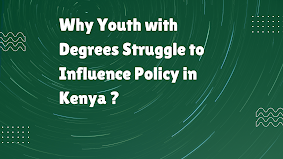In Kenya, thousands of young people graduate from universities and colleges every year, equipped with knowledge, skills, and a desire to contribute to national development. They are articulate, ambitious, and aware of the challenges facing the country — from unemployment and corruption to climate change and governance. Yet despite their academic achievements, many of these youth find themselves locked out of the spaces where real decisions are made. Their voices are often dismissed, their ideas overlooked, and their efforts underutilized in shaping public policy.
So, why does higher education not translate into political influence for Kenyan youth?
1. Politics Still Favors Power, Not Ideas
In Kenya, political influence is still largely determined by money, tribal connections, and loyalty to powerful figures — not necessarily by intelligence or ideas. Young people, regardless of their qualifications, often lack the financial backing or political “godfathers” to elevate their profiles within political parties or government institutions. As a result, highly educated youth are frequently bypassed in favor of more politically connected or wealthier candidates.
2. Age-Based Discrimination and Cultural Norms
Kenyan society often equates leadership with age and experience. The common sentiment of "you’re too young to lead" persists in many institutions, from political parties to public service. Even when youth have advanced degrees and innovative policy proposals, they are seen as inexperienced or “too academic” to understand the realities of governance. These stereotypes silence many young voices before they are even heard.
3. Limited Access to Decision-Making Platforms
Formal decision-making spaces — like parliamentary committees, advisory boards, and government task forces — are rarely inclusive of youth. Even when policies are being made that directly affect young people, they are not invited to the table. Without access to these forums, their ideas remain on paper, and their voices remain in the background.
4. Political Elitism and Exclusion
Political gatekeeping is common in Kenya. Those who do not come from political families, do not align with party loyalists, or are not part of ethnic power blocs are often excluded, regardless of their qualifications. This environment discourages highly educated youth from engaging with formal politics, pushing them into activism, NGOs, or even silence.
5. Mistrust of Youth by Older Politicians
Many veteran politicians view youth involvement as a threat to their power. They may praise the energy and creativity of young people publicly but work behind the scenes to limit their growth. This fear of change leads to a lack of mentorship, blocked opportunities, and a reluctance to implement youth-led policy proposals.
6. Fragmented Youth Voices
While youth are the majority, they are not a unified bloc. Divisions based on tribe, class, region, or political affiliation dilute their collective bargaining power. Politicians often exploit these divisions, weakening the ability of educated youth to organize and influence policy as a united front.
7. Lack of Civic and Policy Engagement Training
Education alone doesn’t equip youth with the skills to navigate Kenya’s complex political and policy systems. Many graduates are unfamiliar with how to lobby for legislation, influence budget allocations, or engage in structured policy advocacy. This gap limits their ability to transition from knowledge to political action.
Conclusion: Bridging the Gap
To ensure that Kenya benefits from its educated youth, the system must change. Political parties need to open doors for young professionals. Government institutions should institutionalize youth participation in policy-making. Civic education and mentorship programs should equip graduates not just to know policy — but to shape it. And most importantly, young people must unite, organize, and assert their right to influence the future of their nation.
Kenya’s youth are not just the leaders of tomorrow — they are a powerful resource for today. It's time to move from being educated but unheard, to educated and empowered.









0 Comments